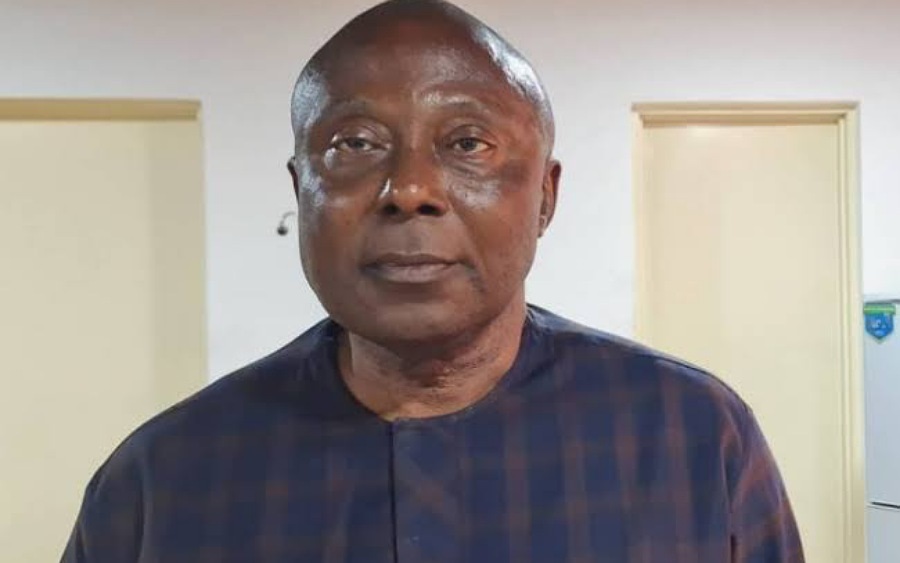The Federal High Court sitting in Abuja, on Friday, heard how a former Acting Accountant-General of the Federation, AGF, Mr. Anamekwe Nwabuoku, used four different companies to siphon public funds to the tune of about N1.96billion.
A Director in the Federal Civil Service, Mr. Felix Nweke, made the revelation when he testified as a witness in the amended nine-count money laundering charge the Economic and Financial Crimes Commission, EFCC, preferred against the erstwhile Acting AGF.
Nweke, who mounted the box as the second prosecution witness, PW-2, told the court that in a bid to conceal the fraud, the looted funds were channelled into bank accounts that had one Gideon Joseph as the sole signatory.
Led in evidence by EFCC’s lawyer, Mr. Ekele Iheanacho, SAN, the witness, while tracing the origin of the fraud, told the court that he worked under the defendant while he served as a Deputy Director in the Defence Ministry.
According to the witness who disclosed that he was the Deputy Director in charge of the Ministry’s expenditure, between 2018 and 2020, part of his functions included the preparation of schedule of inflows and outflows that were due to the Army, Navy and the Air Force.
Nweke said in 2018 when the ex-Acting AGF was posted to the Ministry, he (Nwabuoku) told him that there was the need to make funds available to facilitate some critical stakeholders, the National Assembly and the Federal Ministry of Finance.
He said the defendant, who insisted that they must be creative, suggested that they should get some companies they could use to pull out funds.
He said it was at that point that they contacted Mr. Joseph who was always coming to the ministry with his brother to make supplies.
Continuing, the PW-2, said though Joseph was initially begging him for contracts, he was persuaded to shelve the idea as the issue of contract award was not within his purview.
He told the court that when he informed the defendant about Joseph, he advised that they could enlist him.
“I then took Gideon to Eucharia Ezeodi, who has been coming to the Ministry for business. I also assisted him to open account with Zenith Bank.”
The PW-2 said their contact in the bank assisted them to open four accounts with Joseph as the signatory.
He said they usually raise money either in naira or foreign currencies, adding that the money would then be handed over to the defendant, either directly or through a proxy.
“Sometimes, the director will also ask me to do some transfers to private persons.”
Nweke added that some of the funds they generated were often used to take care of welfare packages for the military since there was no provision for such.
When EFCC’s lawyer asked the witness how funds were paid into the accounts, he said “from the internal security operations account of the military.”
When he was asked who paid the money into the internal security operations account, the witness said, “it is from the ministry’s account that payments were made.”
The witness mentioned about five names from the bank documents who were workers in the Ministry of Defence.
He alleged that funds were also transferred into bank accounts of staff members and withdrawals made afterwards and paid back into accounts of the four companies.
Earlier in her testimony, an official of Zenith Bank Plc, Eucharia Ezeodi, admitted that she knew the defendant while he was a Director in the Federal Ministry of Defence.
The witness told the court that sometime in 2019, she met the defendant who was a Director of Finance and Account at the Federal Ministry of Defence, through the first witness.
She said the EFCC invited her in 2022 in respect of corporate accounts opened for the four companies that were allegedly used by the defendant to move funds out of the coffers of the ministry.
The banker went ahead to list the said companies as: Temeeo Synergy Concept Limited, Turge Global Investment Limited, Laptev Bridge Limited and Arafura Transnational Afro Limited.
She confirmed that accounts of the companies had Mr. Joseph as the sole signatory.
The witness identified bank documents, including statements of account for the four companies, account opening packages, the Corporate Affairs Commission (CAC)’s documents and also her signature on the documents.
While being cross-examined by counsel to the defendant, Mr. Isidore Udenko, the witness said she had no personal relationship with the ex-AGF, except on bank transactions.
When she was asked if the defendant’s name reflected in any of the transactions, the witness replied that a director must not necessarily be a signatory to a company’s account.
She, however, said that a signatory to an account must bring his Identity Card, a Bank Verification Number (BVN), passport photograph, among others, which she said Joseph did.
Ezeodi said the nature of transactions in the account statements was simply deposit and withdrawal, adding that Joseph did all the withdrawals, although the defendant was the alleged beneficiary.
Justice James Omotosho adjourned further hearing in the matter till February 26 and March 5.
It will be recalled that Nwabuoku was in May 2022, appointed to temporarily take charge of the Office of the Accountant General of the Federation (OAGF), after the then AGF, Ahmed Idris, was suspended from office and eventually placed on trial for allegedly laundering public funds totalling about N80.2billion.
EFCC later maintained that the Acting AGF, Nwabuoku, had before his appointment, also dipped his hands into the till.
Investigations into the allegation led to his removal from the office in July 2022, few weeks after he was appointed.
Though Nweke was initially listed as the 2nd defendant, his name was subsequently removed after he agreed to testify against the former Acting AGF.
In the amended charge marked: FHC/ABJ/CR/240/24, the EFCC alleged that Nwabuoku committed an offence that was contrary to Section 18 of the Money Laundering Prohibition Act, 2011, as amended by Act No. 1 of 2012, and punishable under Section 15(3) of the same Act.

